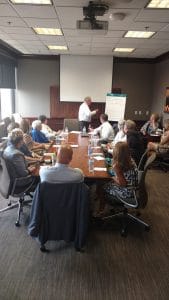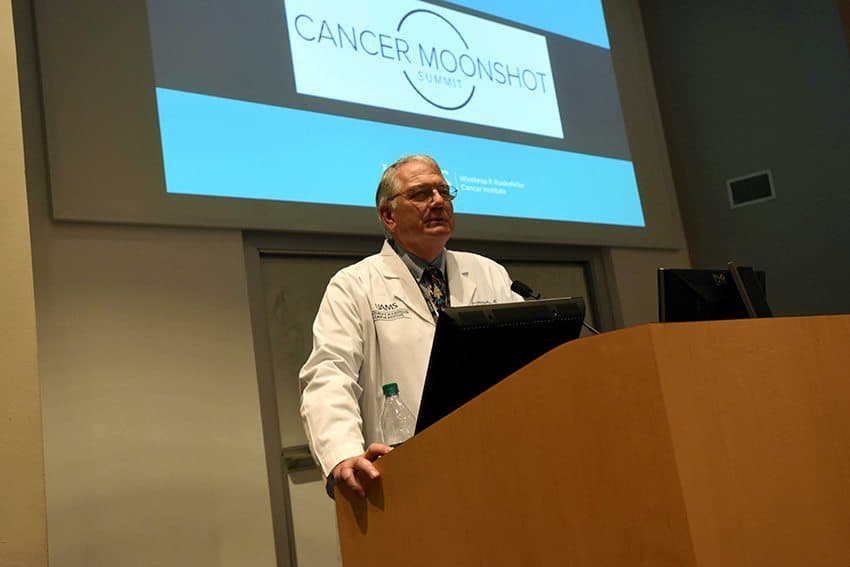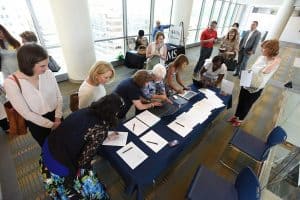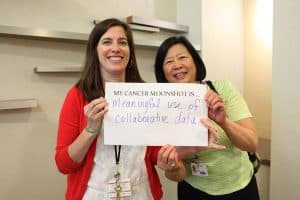UAMS Cancer Institute Hosts Cancer Moonshot Summit
| July 1, 2016 | If you truly want to make a difference, why not shoot for the moon?
That’s the thinking behind the national Cancer Moonshot Initiative, an effort announced by President Barack Obama at the 2016 State of the Union address. The goal of the initiative is to double the rate of progress in cancer research by making a decade’s worth of advances in the next five years.
With Vice President Joe Biden at the helm, the initiative’s task force is focused on forming collaborations across private and public sectors and maximizing the impact of federal investments, patient engagement and targeted incentives.
With task force’s final recommendations due to the president by the end of year, Biden issued a historic challenge to cancer centers and other organizations across the country: Host local summits and events on June 29 to gather input on how to meet the president’s charge.
The local events would be an offshoot of the national Cancer Moonshot Summit hosted by Biden on the same day at Howard University in Washington, D.C.
The results were overwhelming. More than 7,400 individuals gathered at more than 270 events in all 50 states, Puerto Rico and Guam. Of those events, 39 were conducted at cancer centers, including the UAMS Winthrop P. Rockefeller Cancer Institute.
“We were honored to host Arkansas’ summit and be a part of this important national effort. This truly was a statewide effort, with 141 participants from across the state gathering to discuss the future of cancer research and care,” said Cancer Institute Director Peter Emanuel, M.D.
The UAMS event began with a large group session led by moderator Richard Nicholas, M.D., professor in the Department of Orthopaedics and director of the Center for Bone and Soft Tissue Tumors.
In his remarks, Nicholas outlined the goals of the national Cancer Moonshot Initiative and the role of the local summits. “Today, we are joining with thousands of cancer survivors, researchers, advocates, health care professionals and others to add our voice to this urgent national cause,” he said.
Participants viewed a video of Biden’s speech from earlier that day at the national summit in which he outlined progress made by the task force and goals for the future. Following the video, small groups formed to discuss topics related to cancer survivorship, advocacy, research and philanthropy.
“Our small group discussions were insightful and spirited. Not only did we get productive suggestions to report back to the White House, we also found new ways to work together here in Arkansas to better improve our patient care and research efforts,” Nicholas said.
Major discussion points and recommendations included:
- The need for expanded availability and access to clinical trial information through a comprehensive national database and on-site education for patients.
- The importance of patient navigation programs to assist newly diagnosed patients in understanding and moving through the health care system.
-

Small groups met to discuss how progress can be made in cancer advocacy, survivorship, research and philanthropy.
The need for scientists to have a variety of public and private funding sources available that improve overall accountability and transparency in research.
- The impact of private philanthropy on access to cancer care in local communities through funding telehealth programs, clinic expansions, and mobile vans for screening and other services.
- The value of providing a network of support to patients through access to palliative care professionals, social workers and survivor networks.
- The importance of using social media and face-to-face interactions to share information about clinical trials, support groups, prevention programs and survivorship services.
Small group discussion leaders included:
- Research group co-facilitators Thomas Kieber-Emmons, Ph.D., a professor in the UAMS College of Medicine Department of Pathology, and Pat Travis, M.D., a hematologist/oncologist at Highlands Oncology Group in northwest Arkansas
- Advocacy group co-facilitators Robin Dean, coordinator of the UAMS Cancer Institute Auxiliary Cancer Support Center, and Miriam Karanja, director of programs at the Arkansas Cancer Coalition
- Survivorship group co-facilitators Issam Makhoul, M.D., director of the UAMS Division of Hematology/Oncology, and Carrie Calhoon, oncology social worker
- Philanthropy group facilitator Kent Westbrook, M.D., distinguished professor in the UAMS College of Medicine Division of Surgical Oncology


